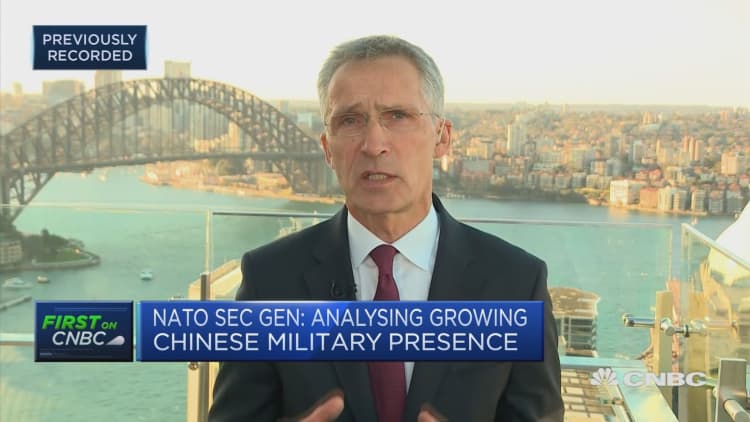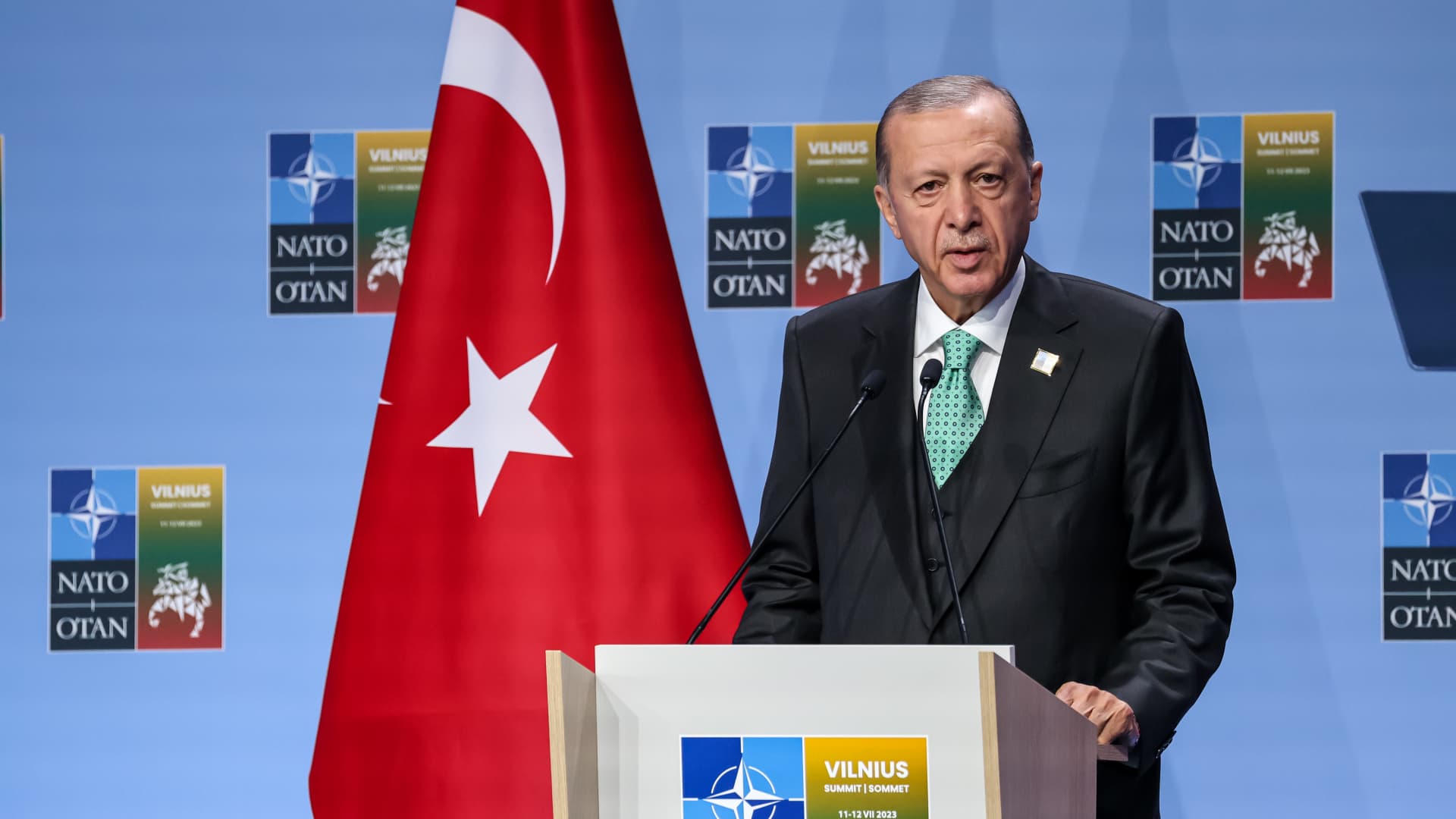President of Turkey Recep Erdogan addresses journalists during the final national press conference during the high level NATO summit in Litexpo Conference Centre in Vilnius, Lithuania on July 12, 2023.
Dominika Zarzycka | Nurphoto | Getty Images
Turkey spent nearly two years — along with Hungary — holding up Sweden’s accession to NATO.
It’s bought powerful Russian weapons systems and its outspoken president, Recep Tayyip Erdogan, openly lambastes leaders of allied Western countries. Relations between Turkey and the West have been strained, to say the least.
But with the decision to allow Sweden into NATO in late January — a move that required unanimous approval by all 31 members of the alliance — it’s as if a switch has been flipped.
Within hours of Ankara’s decision, the U.S. approved a $23 billion sale for F-16 fighter jets to Turkey that had been delayed since 2021. The State Department’s Victoria Nuland said that Turkey would immediately begin receiving modernization kits for its F-16s, and that Washington would be “delighted” to welcome Turkey back into the F-35 program for NATO’s most advanced fighter jet, as soon as the allies resolved the issue of Turkey’s Russian weapons system purchases.
It’s worth noting that Hungary has yet to approve Sweden’s NATO bid, and remains the only member of the alliance standing in the way of the Nordic country’s accession.
“No country within the western orbit has taken so many problematic steps only to be welcomed back with open arms,” David Lepeska, a Turkish and Eastern Mediterranean affairs columnist wrote for UAE outlet The National.
Turkey seemingly has a unique position that allows it to push the envelope and cross lines with its NATO allies. And it’s also welcomed back with open arms after a single change in position, despite calls for stricter accountability by some U.S. lawmakers.
“My approval of Turkey’s request to purchase F-16 aircraft has been contingent on Turkish approval of Sweden’s NATO membership. But make no mistake: This was not a decision I came to lightly,” Democratic Sen. Ben Cardin of Maryland, chair of the Senate Foreign Relations Committee, said in a statement.
A general view of the General Assembly of the Turkish Grand National Assembly (TGNA) during the debate on the Bill on the Approval of the Ratification of the Protocol on Sweden’s Accession to the North Atlantic Treaty Organization (NATO) in Ankara, Turkiye on January 23, 2024. (Photo by Metin Aktas /Anadolu via Getty Images)
Metin Aktas | Anadolu | Getty Images
Sen. Chris Van Hollen, D-Md., said he welcomed Turkey’s ratification, but added: “I continue to have serious concerns about President Erdogan’s ongoing attacks against our Syrian Kurdish allies, his aggressive actions in the Eastern Mediterranean, and the role he played in supporting Azerbaijan’s military assaults against Nagorno-Karabakh. … It is clear that we must keep a close watch on Turkey in the weeks and months ahead – actions speak louder than words.”
Crucial strategic ally
The more a country is needed by its allies and partners on a strategic or economic level, the more it can get away with, geopolitical analysts point out.
Turkey has the second-largest military in NATO after the U.S., its Incirlik air base is a pivotal takeoff point for Western sorties into the Middle East like fighter jet flights over Syria and Iraq during the anti-IS campaign, and it even houses some 50 American nuclear warheads.
“Historically, Türkiye has been a crucial NATO member given its geostrategic position straddling Europe and Asia and controlling access to the Black Sea,” Hakan Akbas, a senior advisor at the Albright Stonebridge Group, told CNBC.
The country controls the Bosporus Strait, a crucial maritime route for global food and agricultural trade and military logistics. It’s also been “an essential partner in various military operations and missions operating side by side with the U.S.,” most recently in Afghanistan, Akbas said.
But Turkey’s strategic value to NATO goes beyond its military role. “It serves as a key player in regional security, bordering Russia, Syria, Iraq, and Iran, and as a transit country for energy pipelines critical to global markets,” Akbas added. “This position gives Ankara a considerable amount of leverage in its dealings with other NATO members, allowing it more latitude than smaller or less strategically located members might enjoy.”
The Turkish government’s friendliness with Russia puts many NATO members at unease; but it simultaneously enables it to do things like broker the Black Sea grain deal and prisoner swaps between Ukraine and Russia.
Washington’s decision to quickly move forward with the sale of F-16s to Turkey “can be seen as a gesture of goodwill from the U.S. and an acknowledgment of Türkiye’s critical role within the alliance,” Akbas said, “keeping it closer vis-à-vis Russia, balancing its security needs with broader concerns about regional stability.”
“It underscores the robust and yet adaptive nature of NATO-Türkiye relations,” he added, “where strategic imperatives often lead to eventual compromises and concessions from all sides involved.”
Remaining tensions
Turkey and its NATO allies, particularly the U.S., still clash in a number of sensitive areas.
Ankara’s purchase of the Russian S-400 missile defense system is a security risk for NATO’s defense systems, Washington says — so much so that the purchase in 2019 resulted in Turkey being locked out of NATO’s F-35 program, which would have seen it partake in manufacturing and acquiring the advanced stealth jets.
Meanwhile, Ankara openly condemns U.S. support for Kurdish militias in Syria that it sees as part of a Kurdish terrorist group threatening Turkey. Its military campaigns against those groups in Syria have even led to sporadic indirect conflict with U.S. forces in the region.

Turkey’s Erdogan also has expressed vocal support for the Palestinian militant group Hamas, which runs the Gaza Strip, and provides safe harbor for some of its leaders who are designated as terrorists by the U.S. Meanwhile, Turkish unilateral actions over maritime disputes with fellow NATO members Greece and Cyprus have also drawn criticism from the alliance.
“Any of these issues could quickly escalate, depending on domestic political or economic developments in Türkiye, changes in the regional security landscape, or shifts in US and NATO policies,” Akbas said.
“The dynamic nature of geopolitics in the regions means that while some disputes may be temporarily resolved or de-escalated, they can re-emerge as significant challenges to alliance cohesion and cooperation.”


